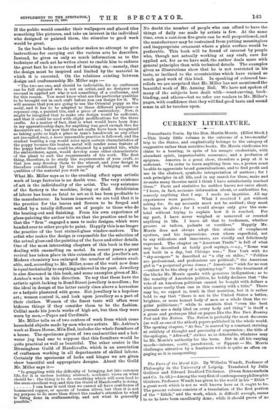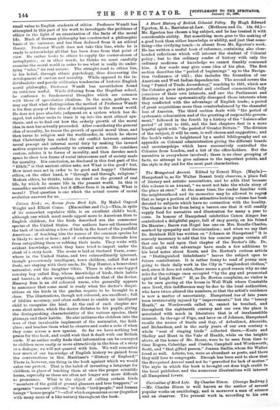The Pacts of the Moral Life, By Wilhelm Wundt, Professor
of Philosophy in the University of Leipzig. Translated by Julia Gulliver and Edward Bradford Titchener. (Swan Sonnenschein and Co. 7s. (3d.)—Among the very first of contemporaryphilosophic thinkers, Professor Wundt has given to the world in his " Ethik " a, great work which is not so well known here as it ought to be. The present volume consists of a translation of the first portion of the " Ethik," and the work, which is difficult enough, seems to us to have been excellently done; while it should prove of no
smell value to English students of ethics. Professor Wundt has attempted in this part of his work to investigate the problems of ethics in the light of an examination of the facts of the moral life. Much of German philosophy has constructed a philosophic basis of the universe, and has then deduced from it an ethical theory. Professor Wundt does not take this line, while he is ready to acknowledge all that has been done from that point of view. He rather looks to ethics to supply the corner-stones of
metaphysics ; or in other words, he thinks we must carefully examine the moral world in order to see what is really its under- lying "telos," its real nature. The straight road to ethics lies, in his belief, through ethnic psychology, thus discovering the development of custom and morality. While opposed to the in- dividualistic and purely utilitarian tendencies of historic English moral philosophy, Professor Wundt has nevertheless found its criticism useful. While differing from the Hegelian school, be confesses to fundamental thoughts which are common with those of speculative idealism. In the main, perhaps, we may say that what distinguishes the method of Professor Wundt is his firm grasp of the idea of development in the moral world. He does not pass absolute judgment on a system which has de- cayed, but rather seeks to trace it up into the next ethical syn- thesis, and so to find out how the orderly growth of the moral idea in man has actually proceeded. After considering the general idea of morality, he traces the growth of special moral ideas, and then turns to religion and the world-order, in which he shows that Christianity has ended the old conflict between external moral precept and internal moral duty by making the inward motive superior to conformity to external action. He considers custom, relates it to forms of morality, and then devotes much space to show how forms of social intercourse and of society made for morality. His conclusion, as disclosed in this first part of the " Ethik," is that ancient ethics asks, not What is the good ? but, How must man act in order to be good and happy ? Christian ethics, on the other hand, is "through and through, religious." Modern ethics, he thinks, takes its stand on the ground of real life, by which he means life in the present world. In this it resembles ancient ethics, but it differs from it in asking, What is moral ? That question is one which the actual course of moral evolution answers for us.



















































 Previous page
Previous page